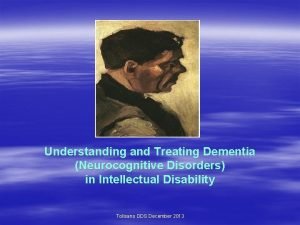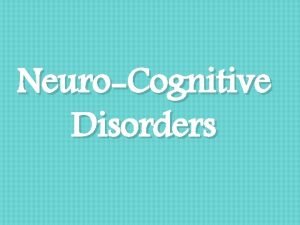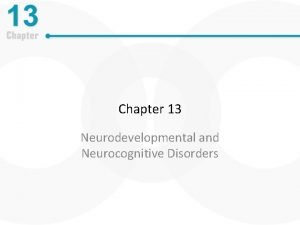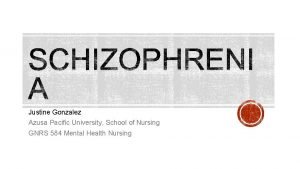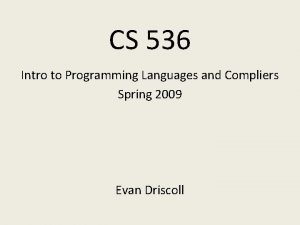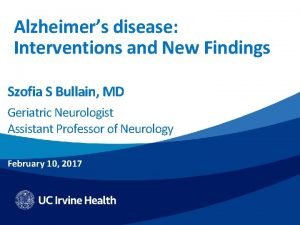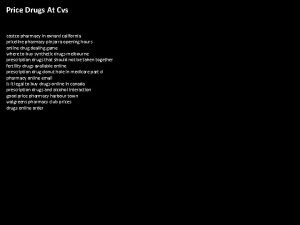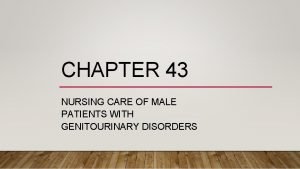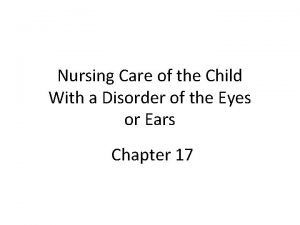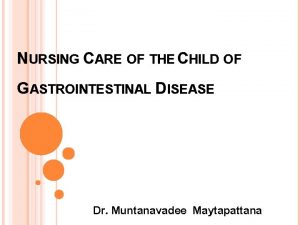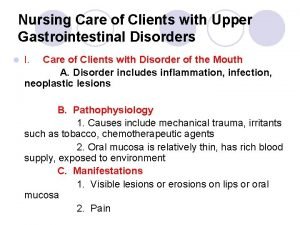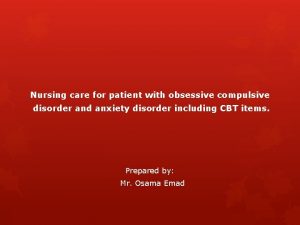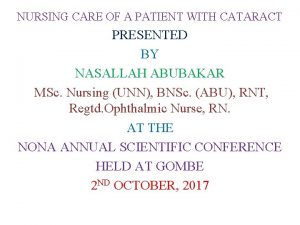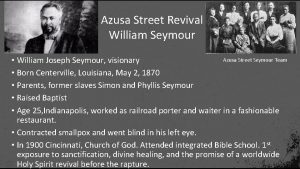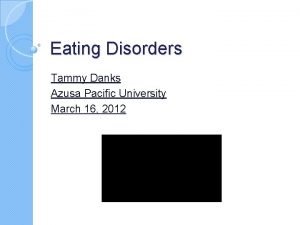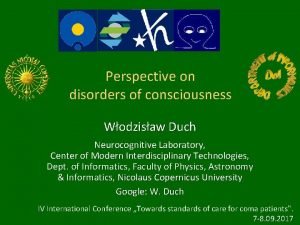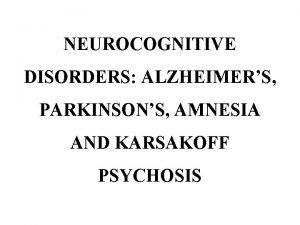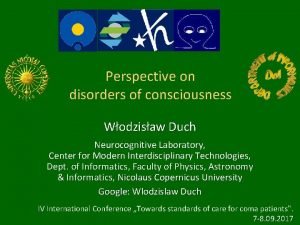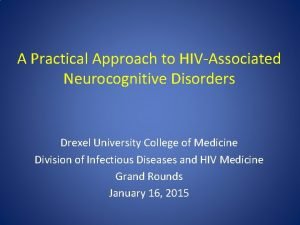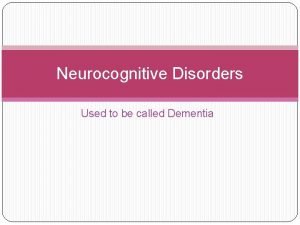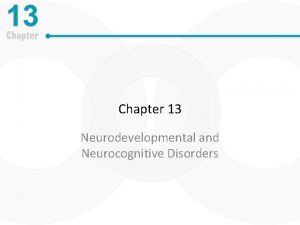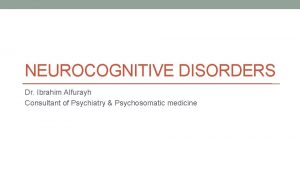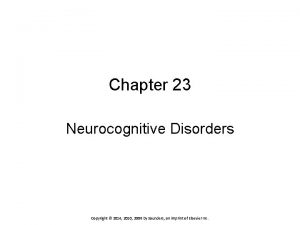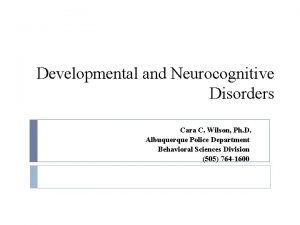GNRS 536 Neurocognitive Disorders School of Nursing Azusa




















- Slides: 20

GNRS 536 Neurocognitive Disorders School of Nursing Azusa Pacific University By Linda Schutz

Walking with people on their way… Clients, family and community https: //www. youtube. com/watch? v=_ODSx 0 Uf. Ac. A

LEARNING Objectives for the lectures on Neurocognitive Disorders s GNRS 536 THE STUDENT WILL BE ABLE TO: 1. Articulate the specifier which distinguishes neurocognitive from disorders that have times of time of cognitive decline. 2. Describe delirium and dementia and understand the difference between the two. 3. Be able to describe the differences between scientific theory and theory associated to psychology, 4. Describe the cognitive domains to be assessed in evaluation of neurocognitive disorders 5. Describe the neurocognitive disorders and at least one of two identifying features of common ones most likely to be see in a PMHNP practice and 6. Identify the cognitive domains seem affected by the common neurocognitive disorders as the disease usually presents. 7. Describe a personal perspective on spiritual care regardless of faith of parents or the cultural living in.

Cases to look at: https: //www. youtube. com/watch? v=LL_Gq 7 Shc-Y https: //www. neurologytimes. com/challenging-cases/increasing-confusion-man-chronic-alcoholabuse? rememberme=1&elq_mid=7308&elq_cid=52660&GUID=2 EFA 3907 -B 6 F 9 -46 EE-AD 93 F 0 D 430 B 49 ECA Ted Talk https: //www. youtube. com/watch? v=tk. Ig-Sx. Pz. TA

What will be the framework that guides your practice as provide care to those with neurocognitive disorders? There are long goodbyes Theories: ? ? : The tasks of the older adult and when there is failure: https: //www. youtube. com/watch? v=a. YCBd. ZLCDBQ&vl=en What is another that assists you? Science and evidence based medicine Ethics and personally held beliefs Nursing models Spiritual concepts : Honor your father and mother, Populations served Culture Presence and Mindfulness

Who and what fits the category of neurocognitive disorders? What is mild neurocognitive impairment Although cognitive deficits are present in many if not all mental disorders (e. g. , schizophrenia, bipolar disorders), only disorders whose core features are cognitive are included in the NCD category. The NCDs are those in which impaired cognition has not been present since birth or very early life, and thus represents a decline from a previously attained level of functioning DSM 5 pp 591 -741 Kaplan and Sadok pp 694 -741 Diagnosis and case formulation Reference: Eramudugolla et al. Alzheimer's Research & Therapy (2017) 9: 15 DOI 10. 1186/s 13195 -017 -0246 -x

Neurocognotive Domains Ref: DSM 5




Comparison of delirium and dementia Delirium is defined as a transient, usually reversible, cause of mental dysfunction and manifests clinically with a wide range of neuropsychiatric abnormalities. It can occur at any age, but it occurs more commonly in patients who are elderly and have a previously compromised mental status. Signs and symptoms The clinical hallmarks of delirium are decreased attention or awareness and a change in baseline cognition. Delirium often manifests as a waxing and waning type of confusion. Symptoms include the following: Clouding of consciousness Difficulty maintaining or shifting attention Disorientation Illusions Hallucinations Fluctuating levels of consciousness Dysphasia Dysarthria Tremor Asterixis in hepatic encephalopathy and uremia Motor abnormalities Ref kaplan and Sadok p 694 -703 Dementia is a syndrome – usually of a chronic or progressive nature – in which there is deterioration in cognitive function (i. e. the ability to process thought) beyond what might be expected from normal ageing. It affects memory, thinking, orientation, comprehension, calculation, learning capacity, language, and judgement. Consciousness is not affected. The impairment in cognitive function is commonly accompanied, and occasionally preceded, by deterioration in emotional control, social behavior, or motivation. Ref: Kaplan and Sadok p 704 -735

Delerium. Dementi. Depressiom https: //www. pri-med. com/onlineeducation/webcast/southwest-2019 -kassdementia? ccode=r 35&utm_source=marketo&utm_ medium=email&utm_campaign=om-cme-of-theweek 052519. email&mkt_tok=ey. Jp. Ijoi. Wl. RJM 05 HWm 1 O akk 0 TVd. FMCIs. In. Qi. Oi. I 1 Vz. Mw. MHM 4 Rlhsbkx. HV 1 p Fa. URk. XC 91 amk 3 Y 2 l 4 VERDa. GM 3 R 2 Ra. Sj. JVM 2 Fr b. FRUN 0 R 4 Mlhv. Sj. Fx. UFVGe. HJi. SVwvb 1 cx. ZStm. R 0 oya. G 1 JT 1 E 1 TENIa. Gp. QWk. Jt. SXgx. Vk. Rk. Y 2 FCa. EF NZzd. RSDl. Kb 1 Bc. L 3 J 1 ZXgz. Yn. Fh. M 1 h. CTmk 3 Y 2 lh. R k 9 u. Mi. J 9

Neurocognitive Disorders Alzheimer’s disease (pp. 611 -614) Huntington’s disease (pp. 638 -641) Frontotemporal lobar degeneration (pp. 614 -618) Another medical condition (pp. 641642) Lewy body disease (pp. 618 -621) Multiple etiologies (pp. 642 -643) Vascular disease (pp. 621 -624) Unspecified (p. 643) Traumatic brain injury (pp. 624 -627) Substance/medication use (pp. 627632) HIV infection (pp. 632 -634) Prion disease (pp. 634 -636) Parkinson’s disease (pp. 636 -638) Ref: DSM 5 Coding note: Code based on medical or substance etiology. In some cases, there Is need Ref: DSM 5

Screening Tools in the Evaluation of Neurocognitive Disorders Folstein’s Mini Mental Exam Mo. Cog Depression Scales: Geriatric Depression, Beck depression, Hamilton

Resources for Neurocognitive Disorders https: //www. nia. nih. gov/health/types-dementia https: //www. alz. org/research/overview. asp https: //www. ninds. nih. gov/Disorders/All. Disorders? title=&title_beginswith=A

Current action in the news connected with HIV

Prion Disease in Dromeda ry Camels, Algeria Baaissa Babelhadj, Michele Angelo Di Bari, Laura Pirisinu, Emerging. Barbara Infectious Diseases Semir • www. cdc. gov/eid • Vol. 24, No. 6, June 2018 Chiappini, 1029 Bechir Suheil Gaouar, Geraldina Riccardi, Stefano Marcon, Umberto Agrimi,

Medication Management Beers Criteria Upto date: Treatment of dementia. Management of neuropsychiatric symptoms of dementia. https: //psychiatryonline. org/doi/pdf/1 0. 1176/appi. books. 9780890426807 https: //psychiatryonline. org/doi/10. 1176/appi. ajp-rj. 2019. 140602

Therapy and Non Pharmacological Interventions: (2 of the 4 Pillars of Care) for those with Neurocognitive Disorders, rf : Steffens, Blazer, & Thakhur, 5 th ed Supportive Care Patient: Care giver: Family: SEX: Inappropriate display of sex https: //www. pri-med. com/online-education/podcast/frankly-speaking-cme-114 -older-sexuality/activity Cohabiting: Living together and not married LGBTQ

Populations, Culture, Health Care, and Spiritual Care Better Than a Halleluiah, by Amy Grant https: //www. youtube. com/watch? v=Rm 5 kx 3 xqmg 0 • What do I believe about man and creation : …the God who sees”, genesis 16: 13 • Give Opportunity for the patient and loved ones them strength, guidance, comfort to say what gives • The team concept and power to serve people • https: //www. youtube. com/watch? v=a. Jxr. X 42 Wcj. Q
 Neurocognitive disorder
Neurocognitive disorder Remiryl
Remiryl Neurocognitive and neurodevelopmental disorders
Neurocognitive and neurodevelopmental disorders Azusa pacific school of nursing
Azusa pacific school of nursing Fhwa-536 local highway finance report
Fhwa-536 local highway finance report Cs 536
Cs 536 Liedboek 536
Liedboek 536 Major neurocognitive disorder criteria
Major neurocognitive disorder criteria Major neurocognitive disorder criteria
Major neurocognitive disorder criteria Origen del pentecostalismo
Origen del pentecostalismo 1906 azusa street
1906 azusa street Azusa revival 1906
Azusa revival 1906 Costco pharmacy vs cvs
Costco pharmacy vs cvs Nursing care of male patients with genitourinary disorders
Nursing care of male patients with genitourinary disorders Myringotomy incision
Myringotomy incision Nursing management of sleep disorders
Nursing management of sleep disorders Nursing care for gastrointestinal disorders
Nursing care for gastrointestinal disorders Borborygmi
Borborygmi Team nursing and modular nursing
Team nursing and modular nursing Ocd nursing care plan ppt
Ocd nursing care plan ppt Preoperative nursing management of cataract
Preoperative nursing management of cataract
